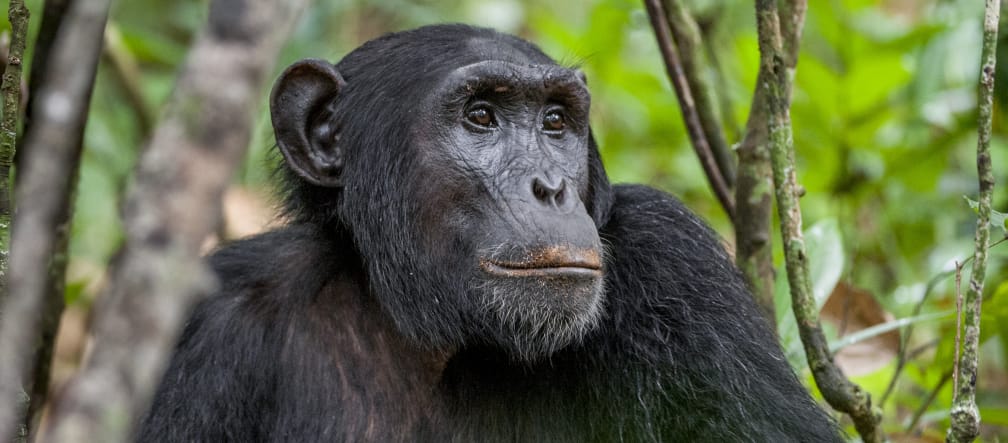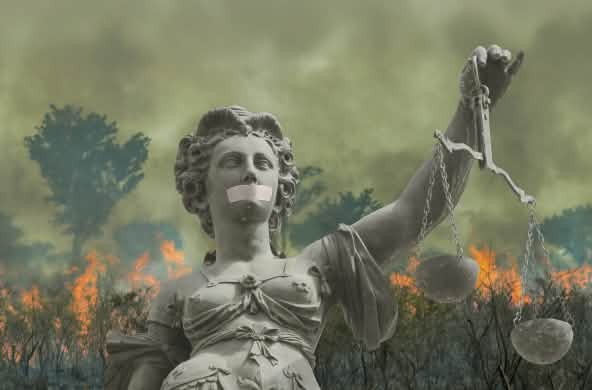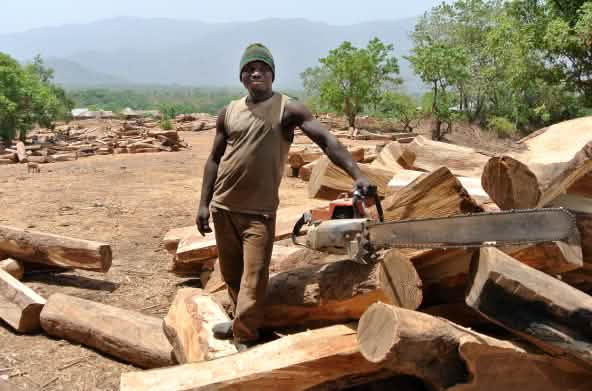
Completed campaign
Stop the sellout of Liberia’s unique forest heritage!
Golden Veroleum Liberia (GVL), a palm oil company, holds hundreds of thousands hectares of land as an agricultural concession. GVL is now pushing to permit logging for export in its concession. International environmentalists are calling for a ban on the export of such timber to prevent the further destruction of rainforests.
To: President Ellen Johnson Sirleaf
“The sale of timber from plantation concessions is illegal in Liberia. Loosening the ban would put the country on a slippery slope to wholesale deforestation.”James Otto does not mince words: “Permitting the sale and export of timber from oil palm concessions will mean the end of many forests.” Liberia is home to 45 percent of the remaining Upper Guinean rainforest with its incredible biodiversity, including populations of chimpanzees and pygmy hippos. Vast swathes of land are at stake, with two corporations – Golden Veroleum Liberia (GVL) and Sime Darby – controlling more than 600,000 hectares. “Managers are putting considerable pressure on senior policymakers to lift the ban,” explained the environmentalist of the Sustainable Development Institute (SDI) in Monrovia.
According to GVL, this move will help communities make use of the timber that otherwise goes to waste when a plantation is established. The company claims that no trees are felled other than those cleared for the plantations. SDI does not believe these assertions.
In any event, both GVL and the communities would need to hire loggers, which are frequently engaged in illegal activities in Liberia. The country’s timber industry as a whole is notoriously criminal.
James Otto’s warning is prompted by Liberia’s uncertain legal situation: at present, commercial logging and timber exports are banned. Were the government to permit the sale of timber from the legal clearing of forest for oil palm concessions, it would simplify the laundering of illegal timber and dramatically increase the pressure on Liberia’s forests.
Liberia committed to protecting its forests in agreements with the UN and EU. Its international obligations would then become untenable.
Fifty international holders of the prestigious Goldman Environmental Prize have joined SDI in calling on Liberia’s government to prevent the export of tropical timber from plantation concessions.
Please add your voice to this cause.
Open Letter from Goldman Prize Laureates
June 30, 2016
We are pleased that the Forestry Development Authority (FDA) of the Republic of Liberia denied Golden Veroleum Liberia’s request for a permit to allow logging for export in its Concession Area. We congratulate the FDA for this decision and encourage the authority to continue its efforts to manage Liberia’s forest in a sustainable manner.
We are, however, deeply concerned that the FDA plans to develop a regulation to allow forest destruction or conversion for oil palm and/or rubber plantations. We note that this does not only contradict the government’s pledge to work with the international community to reduce deforestation and forest degradation, and the restoration of degraded landscapes, it places the future of one of the most viable tract of rainforest in West Africa in danger.
With this letter, we express support for the Sustainable Development Institute’s (SDI) call on the government of Liberia to abandon its plan to legalize forest destruction by removing the current restriction on the export of timber from forest conversion.
We note the Government of Liberia’s endorsement of the New York Declaration on Forest in 2014; Liberia’s Voluntary Partnership Agreement with the European Union; and its partnership with the Kingdom of Norway, and we encourage the government to follow through on its commitments under these initiatives.
Sincerely yours,
1.Leng Ouch, Cambodia, Asia 2016
2. Luis Jorge Rivera-Herrera, Puerto Rico, South & Central America 2016
3. Howard Wood, Scotland, Europe 2015
4. Jean Wiener, Haiti, Island & Island Nations 2015
5. Ramesh Agrawal, India, Asia 2014
6. Desmond Mathew D’Sa, South Africa, Africa 2014
7. Rudi Putra, Indonesia, Islands & Island Nations 2014
8. Azzam Alwash, Iraq, Asia 2013
9. Evgeniya Chirikova, Russia, Europe 2012
10. Ikal Ang'elei, Kenya, Africa 2012
11. Dmitry Lisitsyn, Russia, 2011
12. Randall Arauz, Costa Rica, South & Central America, 2010
13. Lynn Henning, USA, North America 2010
14. Thuli B Makama, Swaziland, Africa 2010
15. Tuy Sereivathana, Cambodia, Asia 2010
16. Marc Ona, Gabon, Africa 2009
17. Maria Gunnoe, USA, North America 2009
18. Olga Speranskaya, Russia, Europe 2009
19. Yuyun Ismawati, Indonesia, Islands & Island Nations 2009
20. Feliciano dos Santos, Mozambique, Africa 2008
21. Ignace Schops, Belgium, Europe 2008
22. Orri Vigfússon, Iceland, Islands & Island Nations 2007
23. Sophia Rabliauskas, Canada, North America 2007
24. Hammarskjoeld Simwinga, Zambia, Africa 2007
25. Craig Williams, USA, North America 2006
26. Silas Kpanan Ayoung Siakor, Liberia, Africa 2006
27. Tarcísio Feitosa, Brazil, South & Central America 2006
28. Yu Xiaogang, China, Asia 2006
29. Pisit Charnsnoh, Thailand, Asia 2002
30. Steve Wilson, USA, North America 2001
31. Bruno Van Peteghem, New Caledonia, Islands & Island Nations 2001
32. Myrsini Malakou, Greece, Europe 2001
33. Giorgos Catsadorakis, Greece, Europe 2001
34. Nat Quansah, Madascar, Island & Island Nations 2000
35. Alexander L. Peal, Liberia, Africa 2000
36. Michal Kravčík, Slovakia, Europe 1999
37. Dr. Bobby Peek, South Africa, Africa 1998
38. Atherton Martin, Dominica Republic, Islands & Island Nations 1998
39. Anna Giordano, Italy, Europe 1998
40. Paul Cox, Samoa, Islands & Island Nations 1997
41. Juan Pablo Orrego S., Chile, South & Central America 1997
42. Albena Simeonova, Bulgaria, Europe 1996
43. Ricardo Navarro, El Salvador, South & Central America 1995
44. Laila Iskandar, Egypt, Africa 1994
45. Heffa Schuecking, Germany, Europe 1994
46. Andrew Simmons, St. Vincent and the Grenadines, Islands & Island Nations 1994
47. Sviatoslav Zabelin, Russia, Europe 1993
48. Christine Jean, France, Europe 1992
49. Dr. Mathieu Wadja Egnankou, Ivory Coast, Africa 1992
50. Cath Wallace, New Zealand, Islands & Island Nations, 1991
To: President Ellen Johnson Sirleaf
Madame President,
The palm oil company Golden Veroleum Liberia holds hundreds of thousands hectares of agricultural concessions. The company is now requesting a permit to allow logging for export in its concession area in Sinoe County for oil palm development. To date, the Forestry Development Authority (FDA) has refused to issue such a permit.
Environmentalists and social justice groups from around the world worry that if Golden Veroleum Liberia were to get the permit, rainforests will be clear-cut and transformed into plantations, severely impacting the lands and livelihoods of the communities that depend on these forests. A ban is currently in place on the export of timber from agricultural concessions like Golden Veroleum's. The trade would thus be illegal. Lifting the ban would also facilitate the laundering of illegal timber, with grave consequences for Liberia's forests outside of the concession areas.
Liberia has signed international agreements like the New York Declaration on Forests and the Voluntary Partnership Agreement with the EU and committed itself to the protection of its forests.
Please comply with your responsibilities for Liberia's nature and prevent the export of timber from agricultural concessions.
Sincerely,

